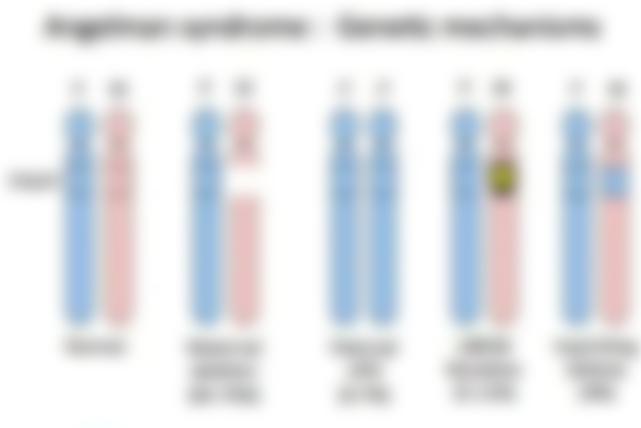Dear readers, I will write to you about a rare genetic syndrome. The point of my writing about health problems is to raise awareness among people that we have to take care of our health and to have regular check-ups with our doctors.
Angelman syndrome is a genetic disorder that causes developmental difficulties and neurological problems - difficulties with speech, balance and walking, and in some cases epileptic seizures.
It developed on chromosome 15 inherited from the mother. It was named after Dr. Harry Angelman, the British pediatrician who first described the syndrome in 1965.

Angelman syndrome is not usually detected until parents begin to notice delayed development when the baby is between 6 and 12 months old.
Seizures often begin at the age of 2 to 3 years.
The clinical picture of a person with Angelman syndrome is variable.
The overlap of symptoms of this disease with the symptoms of other disorders (Rett syndrome, Prader Willi syndrome, idiopathic non-progressive encephalopathy, Lennox Gastaut syndrome or pervasive developmental disorders) is also common.
Angelman syndrome treatment focuses on managing a child’s health and developmental problems.
Symptoms of Angelman syndrome
Angelman syndrome occurs in approximately 1 in 20,000 newborns.
Symptoms develop gradually so that they depend on the age of the person and also on the genetic mechanism of the onset of critical region dysfunction. Those with a deletion (loss of a part of a chromosome) have the most difficult and typical clinical picture.
Characteristic signs and symptoms of Angelman's syndrome are:
developmental delay, for example, if the child does not crawl at the age of 6 to 12 months or intellectual disability,
microcephaly,
lack of speech or minimal speech (some pronounce only a few words),
feeding problems
inability to walk, move or maintain balance,
spastic (rigid) gait and movements,
trembling movements of the arms and legs (so-called "flapping"),
often smiling and laughing.
People diagnosed with Angelman's syndrome may also have other symptoms, including:
epileptic seizures that usually begin between the ages of 2 and 3,
strabismus (squinting, running away from the eye),
walking with your hands "in the air",
protruding lower jaw (progeny).
Complications associated with Angelman syndrome include:
hyperactivity,
sleep disorder,
scoliosis,
obesity.
Treatment of Angelman syndrome
The syndrome is diagnosed by genetic testing, and in the process of detecting the disease, after the suspicion is based on the clinical picture, a characteristic EEG finding can also contribute. Prenatal testing is sometimes used (possible).
Since there is no way to “repair” chromosome damage, there is no cure for Angelman syndrome.
Treatment focuses on managing developmental problems.
Depending on the child's symptoms, treatment for Angelman's syndrome may include:
Seizure control medications (anticonvulsants) - may be needed so that seizures caused by Angelman syndrome can be controlled.
Physical therapy - Children with Angelman syndrome can learn to walk better with the help of physical therapy. Other movements and activities learn to compensate and better "become independent" with the help of occupational therapy.
Communication therapy - although people with Angelman syndrome usually communicate only in simple sentences, communication therapy can be helpful. Non-verbal communication can be developed using sign language and images.
Behavioral therapy - can help children with Angelman syndrome to overcome hyperactivity and short attention spans, which can help development. Although the stage of development of people with Angelman syndrome can vary considerably, many will be able to build relationships with friends and family.
All types and methods of therapy are used to get the most out of it and to improve the child's quality of life.
The world's doctors are hoping to find a genetic drug that will cure children from this syndrome! With all my heart, I wish them success in that!
Thank you for reading my article! I hope you take care of your health! I wish you all the best! Greetings for everyone from @MarijaJak
1.12.2020.

They are called angel children because of the frequent characteristic laughter, they like to cuddle, they are very cuddly but also hyperactive, they do not say they have epilepsy.